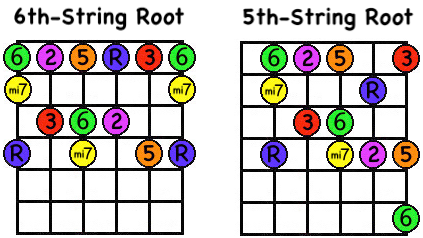The Mixolydian Distinctive
- Jay EuDaly

- Jun 14, 2021
- 3 min read
The basic concept of this "Modal Distinctives" series is that you can get to the distinctive sound of a mode without learning the whole mode, or getting all confused by modal theory, but by adding, or altering, a single note of the most commonly-known scale among guitarists; the Minor Pentatonic. Here are the two Minor Pentatonic Scale patterns that we've been working from; one with a 6th-string root, and one with a 5th-string root:

The number of each note is based on the notes of the Natural Minor Scale (don't worry about whether you know it or not). As you can see, there are two notes missing; the 2nd and the 6th. You should drill the above two patterns in every key around the Circle.
If you don't know what I mean by, "around the Circle," stop right here and download the 5-Lesson Foundational Series. This series of lessons teaches the Circle of Keys as an organizational mechanism by which you ensure that whatever you learn is drilled in every key in all possible positions. It also gives you a method to find any note, anywhere, without memorizing note names on every string. That is a beautiful thing!
You can download the 5-Lesson Foundational Series right here for free with no further obligation or commitment:
Commensurate with the Quick & Dirty concept we're going to simplify things even more by only dealing with the upper octave, which is where most of the soloing activity occurs:

The Mixolydian Mode is major. So how can you get a major-type sound from the Minor Pentatonic?
There are two ways; I'll give you the easiest one first; after all, this whole Modal Distinctives series is about the quickest way to modal sounds, though not to the entirety of whatever Mode we're dealing with.
1) Sharp the 3rd.
Minor Pentatonic with a Major 3rd

Here's the upper octave where most of the soloing activity occurs:

The Mixolydian can used over both Major and Dominant chords. Both those chord types contain a Major 3rd. See Major and Minor Bar Chords and also Quick & Dirty 7th Chords for an explanation of "Dominant."
The waters are muddied somewhat by the fact that the Minor Pentatonic can also be used over Major and Dominant chords. When that happens the sound is more 'bluesy." So it is common that the Minor Pentatonic is used over a Dominant chord and the Minor 3rd is resolved upward (many times by a hammer-on) to the Major 3rd (see the video below for a demonstration).
Because of that, this method (sharping the 3rd of the Minor Pentatonic) is by far the most-used.
2) Employ the Major Pentatonic Scale
(arrived at via the concept of relative harmony given in the previous lesson in this series, The Ionian/Lydian Distinctive) and add a Minor (flatted) 7th to the scale. I sometimes refer to the b7 as a "Mixolydian 7" (my idiosyncratic terminology) because the flatted 7th of the Major Scale is the distinctive sound of the Mixolydian Mode.
Major Pentatonic with a Minor 7th

And the upper register only:

Sharping the 3rd of a Minor Pentatonic scale (or adding a b7 to the Major Pentatonic scale) is not the entire Mixolydian Mode, but it might cause an educated listener to conclude, "Oh, he's using the Mixolydian Mode" and they'd be right; but that's not how we're thinking. We're merely altering a single note of the Minor Pentatonic (or adding a single note to the Major Pentatonic) to get the distinctive sound of the Mixolydian Mode.
Would you like to gain a more complete understanding of modes? Going Modal is a complete, guitar-friendly lesson series that is currently (May 2021) being given away for free via Master Guitar School's monthly newsletter! To receive the newsletter just sign up as a Master Guitar School site member and get the next lesson of Going Modal in your inbox each month.
For more information on site membership see Why Become A Site Member?
Sign up as a Master Guitar School site member - it's free! - and get access to dozens of free site-based lessons, a monthly newsletter that contains a brand-new free lesson, and DEEP discounts on lesson series downloads - plus more!











Comments